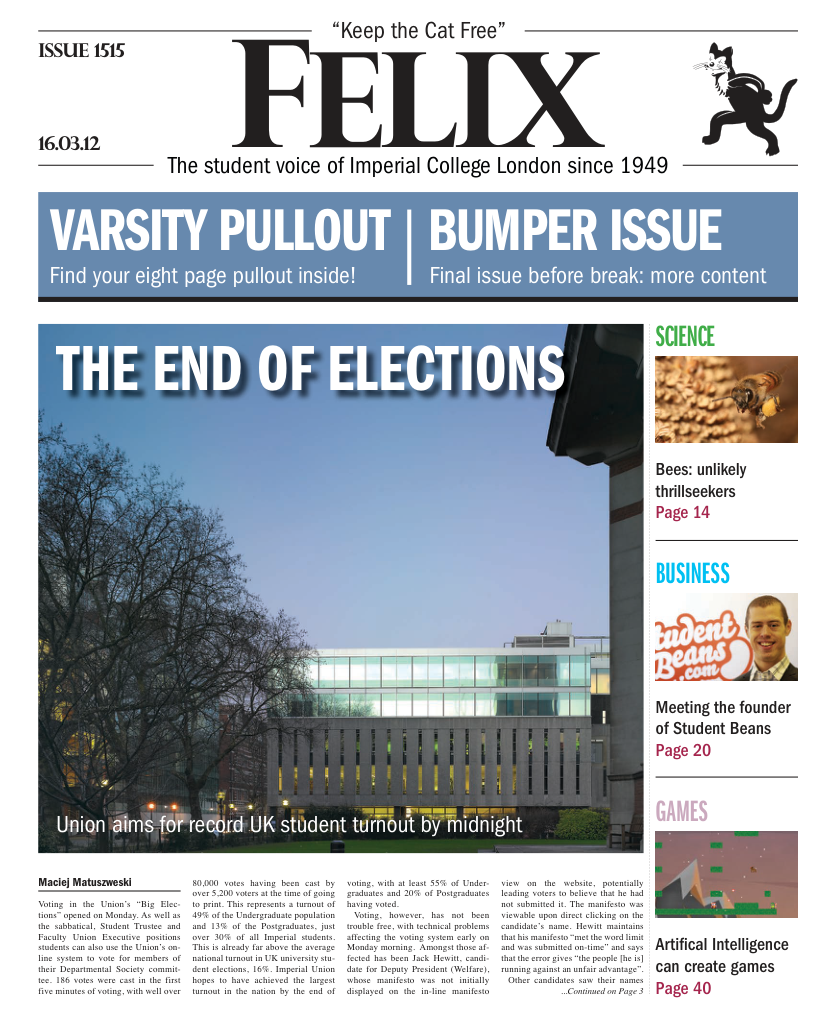IC’s international scene
Union policies threaten the Overseas Societies Committee

The Overseas Societies Committee is the arm of the Imperial College Union which both looks after the interests of and manages all of the international societies present at Imperial. With a current strength of 38 societies under our watch, the total membership that comes under the OSC amounts to a staggering figure of 2126, making us one of the largest Management Groups around. The line-up of events for the OSC this year witnessed the inauguration of the OSC World Summit and the International Festival entitled ‘The Melting Pot’, alongside our staple events which included the OSC Football World Cup and the International Night. Apart from Management Group level activities, a large number of constituent societies also very enthusiastically stage their own annual cultural performances to showcase their tradition and heritage in an emphatic style.
It may seem like a no-brainer to an outsider that the international scene at Imperial College London should be one that is flourishing and thriving in light of the highly cosmopolitan make-up of the student community. However, the flowery picture I have painted in the first paragraph is simply a façade which hides an unsettling truth behind it. In reality, the OSC is suffering from a declining spiral which is threatening its very existence. A deeper probe into the situation uncovers several fundamental issues international societies are facing, as I shall depict below.
First, Union policies have been structured to not support activities which involve food. Sadly, food is sometimes one of the most effective ways of sharing various cultures and traditions with one another and it is not surprising that the international societies are suffering beacuse of this.
Second, arguments which are usually put forward by other Management Group Executives point to the fact that certain cultural shows are profit-generating, hence they should not receive financial support from the Union. Little do they realise that they have gotten the order of cause and effect horrendously wrong. The progressive cuts in the budget of the OSC has driven societies to increase their ticket prices year after year, with the minimal profit they generate channelled back to finance events involving food (which they receive absolutely no grants for) or donated generously to a charity in an attempt to benefit the community around us. Moreover, we should also understand the main source of this ticket income: it comes from the very pockets of international students like myself who attend several shows a year in support of fellow international students, with the damage usually amounting to around £50 by the end of Spring term.
Third, on top of the worrying problem of a shortage of funding, international societies are further slapped with huge fees for running cultural performances. The cost incurred amounts to £2500 on average, of which approximately £2000 is attributed to lighting and sound equipment hire from Dramatic Society, and approximately £500 is attributed to the charge by the Conferences & Events office for the Great Hall hire. While the figure for Dramatic Society’s services may seem like an excessive amount, charging to hire an auditorium within the school which we pay fees to attend seems a rather ridiculous policy in my opinion.
What I have described is simply the tip of the iceberg. These persistent problems have severely undermined the activities and events within the OSC. Even the inauguration of two new large-scale events in the form of the OSC World Summit and the International Festival failed to reinvigorate our quest to increase funding for the OSC. The Management Group took hefty cuts for the third consecutive year, which saw us drop to a funding level of £4186 for the upcoming academic year.
This figure reflects the largest percentage drop amongst all Management Groups and Faculty Unions, and the current amount stands at a worrying 60% of the funding level back in 2009/10. With some simple mathematics, each member within the OSC is given, on average, a £1.97 grant for a full academic year. In my opinion, these figures seem to have some stark resemblance to poverty statistics quoted in many reports. Such is the sorry state of the support that the OSC currently receives.
In the past few weeks, this issue has been surfaced by several key leaders and election candidates within the Union. Comparisons have been made between the £4186 received by the OSC and the approximate amount of £15000 received by a 60-member-strong Gliding club. It is heartening to know that there are student leaders who understand our concerns, and it is the hope of the international community that there will be more amongst the student population who will lend their ears and appreciate our plight.
There are exemplary models around in other Universities to draw comparisons to. The One World Week at Warwick University is an annual extravaganza aimed at celebrating the diversity of the student population through forums, debates, discussions, parades, performances and a large host of sports and games. This event is by no means an easy task for volunteers to organize, but it is without doubt impossible to put in place without ample support from the University. Glancing over to our close neighbours at King’s College London, international societies get their College theatre venue for performances at negligible running costs, including light and sound equipment. International students who are aware of such discrepancies in funding within our College can only yearn for equal levels of support to those provided at other Universities, and we are left to reflect on the absence of the true international experience that Imperial had promisingly looked to offer. It is the duty of not just the student leaders, but all members of the student community to stand up on this issue so as to curb the degradation of the international scene at Imperial.
It would be foolish to expect changes to happen overnight, but it is time for us to rally together to lift the international scene to the dizzying heights that it is potentially capable of reaching. More importantly, my use of the word ‘us’ in the previous sentence refers not just to international students but local students as well, for the benefits of improving the international scene will have far-reaching positive effects for the entire student community. Local students will stand to gain from a more holistic experience of the plethora of cultures and traditions that international students represent, right here in their home country. Other concomitant positives include improvements in satisfaction surveys, advancement in University rankings, and even possibly the boosting of our reputation to become one of the most prestigious institutions where the best minds from all over the United Kingdom and the world assemble to study, work, and play in a warm and inclusive cosmopolitan environment. It is a dream of many of us that one day every student who walks through the gates of Imperial College London can say that he or she has had a truly international experience at this world-renowned establishment. But it is only if everyone works together that this dream can be achieved.
Do your part, and stand up for our cause!






